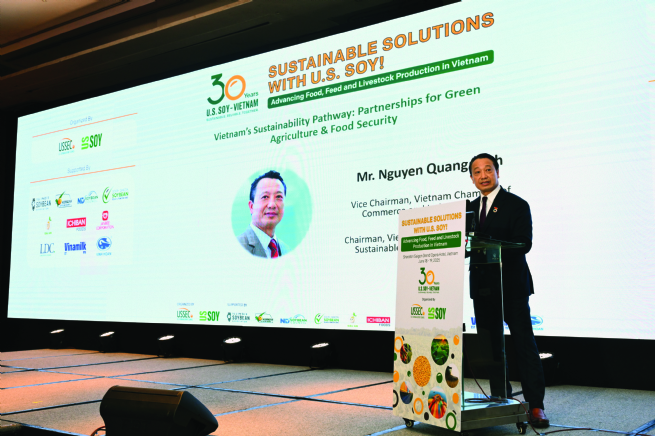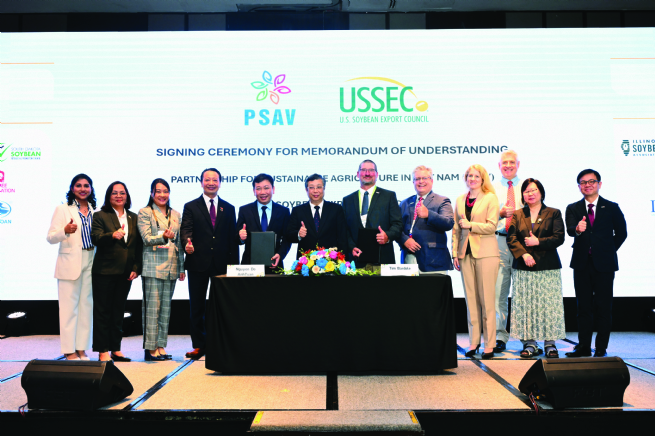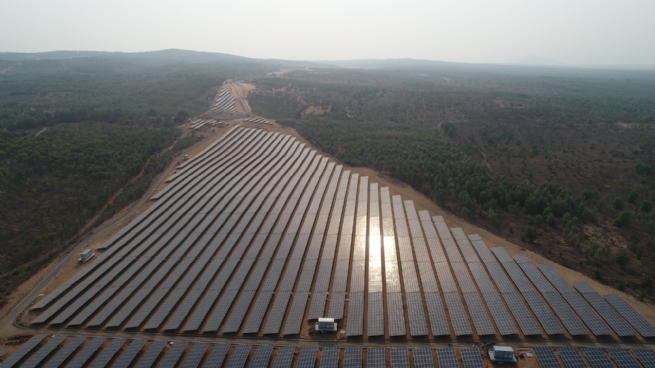Bolstering Vietnam-U.S. Business Connectivity
As an advisory body and a link between the government and the business community, the Vietnam Chamber of Commerce and Industry (VCCI) has consistently worked hard to promote initiatives, cooperative projects and reforms in laws and administrative procedures that help create an enabling business environment.
These have helped enhance Vietnam-U.S. economic and trade relations and reaffirm the role and contributions of the business community in creating the shared value and prosperity.
Joint efforts toward a common goal
During his visit to Vietnam in 2017, U.S. President Donald Trump stated, “Over the past three decades, our two nations have come together to find common purpose based on common interests. And that's what's happening.” To achieve this, not only have the leaders of Vietnam and the U.S. made ongoing efforts over the years but the business communities of both countries have also worked diligently toward a shared goal of a brighter future that we can reach together through even more meaningful milestones.

Mr. Nguyen Quang Vinh (4th from left), VCCI Vice President and VBCSD Chairman
Over the past years, VCCI as a representative of the Vietnamese business community has signed several memorandums of understanding (MOUs) and maintained strong partnerships with key U.S. partners, organizations and business community such as the U.S. Embassy in Vietnam, the American Chamber of Commerce in Vietnam (AmCham), the U.S. Chamber of Commerce, the San Francisco Chamber of Commerce, the Los Angeles Area Chamber of Commerce, and Andrews University among others.
Based on these partnerships, VCCI has hosted or co-organized many major programs and events to strengthen trade and investment connections while offering recommendations for administrative procedure reforms to create a more favorable business environment. These include State President’s meeting with the U.S.-APEC Business Coalition - a annual event held on the sidelines of the APEC Economic Leaders’ Week; the U.S.-ASEAN Business Council; and the Vietnam Business Forum (VBF) - a policy dialogue platform between the government and business associations aimed at fostering an enabling investment environment. Co-chaired by VCCI, VBF has played a key role in promoting open, constructive dialogue mechanisms and enhancing transparency in Vietnam’s reform process.

Mr. Nguyen Quang Vinh (4th from left), VCCI Vice President and VBCSD Chairman, attends the MOU signing ceremony between the U.S. Soybean Export Council and the Partnership for Sustainable Agriculture Development in Vietnam to enhance Vietnam–U.S. agricultural cooperation
Specially, the annual Vietnam-U.S. Business Summit, co-organized by VCCI, AmCham and the U.S. Chamber of Commerce, is an effective platform for government leaders together with representatives of central agencies and leaders of major businesses from Vietnam and the U.S. In 2024, the 7th summit was held with the participation of the Prime Minister and nearly 150 delegates. Under the theme “Policies and Approaches to Ensure Mutually Beneficial Commercial Relations,” the summit focused on discussing key bilateral trade and investment topics; unlocking the potential of the digital economy to drive growth and innovation; addressing development and energy security needs through practical and effective actions; and enhancing productivity while reducing procedures, costs and risks to maintain competitiveness.
The 8th Vietnam-U.S. Business Summit is scheduled to take place in October 2025 in Hanoi, drawing wide participation from government leaders and CEOs from both countries.

Mui Ne Solar Power Plant, a renewable energy project by U.S.-based Pacifico Energy
In addition, VCCI regularly organizes training courses, workshops and business networking events to foster connections between Vietnamese and U.S. enterprises. It also leads trade promotion delegations to the U.S. and vice versa to enable businesses from both countries to explore information and cooperation opportunities. Notable examples include hosting business delegations from Utah; businesses from Houston City, Texas; the Government of Washington State; Citibank; IKEA; PayPal and high-tech agricultural businesses.
Recently, in addition to coordinating a joint letter with AmCham sent to the U.S. Secretary of Commerce, VCCI - representing the Vietnamese business community - submitted a letter to the U.S. Department of Commerce and the Office of the United States Trade Representative (USTR), as well as to VCCI’s key partners including the U.S. Chamber of Commerce, the U.S.-ASEAN Business Council (USABC), and several local chambers of commerce in the U.S., calling for the postponement of tariffs to create conditions for bilateral negotiations.
In the time ahead, to further enhance the effectiveness of business community connectivity, VCCI will revamp its trade and investment promotion efforts by combining the expansion and quality improvement of traditional activities with the development of new activities and flexible, high value-added business development support services based on digital applications to meet businesses’ development requirements in an increasingly integrated era as now.
Vast potential for cooperation across multiple sectors
Each U.S. presidential election has a wide-ranging impact on U.S. trade and investment policies. Nevertheless, this has not dampened the interest of U.S. businesses in the Vietnamese market. The U.S. remains one of Vietnam’s top foreign investors. As of April 30, 2025, the U.S. had 1,447 active projects in Vietnam, with total registered capital exceeding US$11.94 billion, ranking 10th out of 143 countries and territories investing in Vietnam. Most major U.S. corporations are already present and operating effectively in Vietnam. Additionally, the U.S. is increasingly becoming a key supplier of machinery, equipment, technology and energy to Vietnam.
Guided by the principle “domestic resources as the foundation, long-term strategy as the key determinant; external resources and the power of the times as breakthrough drivers,” Vietnam has adopted flexible and innovative solutions to accelerate green transformation, promote the circular economy and respond to climate change to support sustainable economic development and align with stringent U.S. import standards.
In agriculture, Vietnam is currently the 9th largest export market for U.S. agricultural products, with export turnover reaching US$2.76 billion in 2024. Products such as beef, pork, chicken, seafood, dairy, soybeans, corn, grapes, apples, cherries and blueberries are increasingly favored by Vietnamese consumers. During a recent mission to the U.S. by leaders from Vietnam’s Ministry of Agriculture and Environment, agreements were signed to purchase nearly US$3 billion worth of U.S. agricultural products. This figure proves the vast potential for trade cooperation between the two countries.
Despite challenges ahead, many U.S. businesses continue to invest significantly in Vietnam. With joint efforts from both sides, investment and trade are expected to continue expanding in a balanced manner that benefits both nations.
Notably, Vietnam-U.S. science, technology and innovation cooperation has seen major progress, especially after the two countries upgraded its relationship to the Comprehensive Strategic Partnership, with two breakthrough pillars: innovation and semiconductor industry. In the digital age where emerging technologies such as AI, blockchain and big data are rapidly transforming how businesses work, transact and operate, cooperation in these areas is highly complementary for joint development.
In particular, the U.S. brings core technologies, advanced expertise and strong financial capabilities while Vietnam offers effective implementation based on its abundant human resources and strategic geographic location. This creates a well-balanced allocation that ensures mutual benefit and shared responsibility in cooperation, especially as Vietnam executes Resolution 57 on breakthrough development in science, technology, innovation and national digital transformation. This is complemented by Resolution 68 on private sector development, Resolution 66 on legal system reforms and law enforcement to meet national development requirements in the new era and Resolution 59 on international integration in the new setting, collectively referred to by General Secretary To Lam as the “four foundational pillars” that form a theoretical and action-oriented framework that lays the groundwork for Vietnam’s consistent systemic transformation toward an integrated development model in the new era.
Indeed, the potential for Vietnam-U.S. business cooperation is enormous, especially in the search for advanced technological solutions to boost creative industries, fintech and various other sectors.
Vietnam consistently regards the U.S. as a leading partner and aspires to develop a comprehensive and sustainable economic, trade and investment relationship with the U.S. This contributes to enhancing the understanding and strategic trust between the two nations. As a representative of Vietnam’s business community, VCCI is committed to supporting businesses to achieve development, form connectivity and leverage cooperation expansion opportunities with international partners, especially with U.S. businesses.
Nguyen Quang Vinh, MBA, Vice President of VCCI, Chairman of VBCSD








